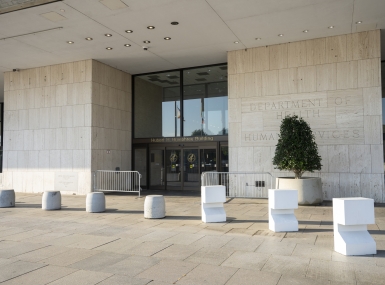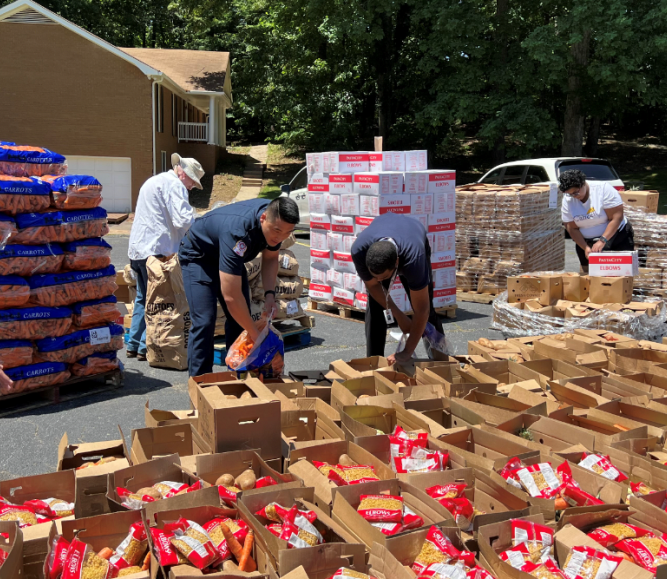Author

Meredith Moran
Upcoming Events
Related News
Key Takeaways
Gwinnett County, Ga. is working to fight food insecurity by establishing community gardens in its county parks, where volunteers help grow produce that is donated to local food pantries.
Through its “Live Healthy” initiative, Gwinnett County leases plots of land in its parks for people who want to grow their own food, but don’t have the space to. There are roughly 400 plots across 11 county parks. To lease one of the 4 x 8 raised bed spaces, Gwinnett County residents pay an annual fee of $35 and agree to volunteer at least 12 hours each year to maintain the community share rows.
Learn more
The initiative has donated more than 25,000 pounds of food in four years to local food pantries, co-ops and faith-based organizations, according to Bradley Livesay, Live Healthy Gwinnett’s program coordinator.
“It’s all fresh, locally grown produce,” Livesay said, “which they’re really excited to get, because a lot of the times, what they’re getting in from the Atlanta Food Bank or other places, is more shelf-stable type food.”
Each community garden has two volunteers who are designated “ambassadors,” who help oversee the day-to-day maintenance of the garden.
Shirley Bohm, a 79-year-old ambassador at Vines Park, grew up on a farm and has been gardening her whole life. She doesn’t have enough space for gardening in her backyard, so the program was a great way for her to continue her love for growing and helping the community, she said.
“I’ve always gardened at every place that I’ve lived, so it’s just in my blood,” Bohm said. “I really enjoy it, it’s very satisfying, and I love working in the soil and seeing plants grow. There’s something about growing things that’s very relaxing.”
Vines Park donated nearly 2,700 pounds of produce from its community garden to the local food co-op last year alone.
“I’m pretty lucky that, as old as I am, I can still get out and work. I’ve got enough money to support myself and I have a house and all of that kind of stuff,” Bohm said.
“Everybody doesn’t have that. And it’s really nice to be able to do something for people who aren’t as lucky as you are. So, the community garden concept … besides just growing and picking things that you grew yourself, to be able to donate it to somebody who really needs it, that’s a nice feeling.”
It’s currently the warm season, which goes from late April through September, so the types of food being planted in the community gardens include peppers, okra, eggplant, tomatoes, beans and zucchini, among others. Kale, collard greens, carrots and radishes are some of what gets planted in the cool season, according to Livesay.
More than 130 languages are spoken throughout Gwinnett County and more than 25% of the population was born outside the United States. It’s the most diverse county in Georgia, and that’s reflected in the community gardens, Livesay said.
“Because the gardens are so spread out, you can really see the cultures that are utilized in the garden,” Livesay said. “So, if you go to Peachtree Ridge Park, there’s an Asian community that’s up there, and they’re growing sesame at that garden, or if you go down to Lenora Park, there’s a population that’s from the Caribbean islands where they’re growing Grenada peppers.”
Tori Johnson is an ambassador at West Gwinnett Park, which is currently growing Japanese eggplant, tomatillos, dill and jalapenos. She said she loves to garden because of the “zen” feeling it brings her.
“We’ve been giving food to Neighborhood Cooperative Ministries, and some of us [gardeners] volunteer over there too, and it’s just fun to see people come up to get their food distribution, and they get this really good, organic, beautifully grown produce that they’re like, ‘Wow, I can’t believe you did that for us.’ … And we learn something each year.
“We’ve learned about trap crops, we’ve integrated more pollinators and planted things that will attract beneficial insects, so it’s a big learning experience.”
The community gardens also offer environmental education to the community, for everyone, ranging from children to the elderly.
One cooking program through the county teaches children as young as five years old how to use kitchen utensils safely and they take fresh ingredients from the garden to make guacamole.
The first community garden the county opened is across the street from a senior center, so all of the garden beds are raised and ADA accessible, so someone is still able to garden in a wheelchair without having the barrier of needing to bend over.
The 11 community gardens are spread out across the county, but all of the ambassadors meet quarterly to share best practices and discuss anything they’re struggling with.
“Some of our sites do all of the planting in above-ground raised beds, some sites have inground rows that we’ve tilled up, others have a high tunnel,” Livesay said. “So, it’s really valuable feedback for us that we’re able to take and then just kind of go out and improve the program.”
The sense of community is one of the best parts about the program, Bohm said, and community gardens are something that can be easily replicated anywhere, she added.
“It sounds kind of dorky, but we really are becoming a community,” Bohm said.
“We help each other when somebody’s on vacation or somebody has a conflict. Your neighbors will help water or help pick. We had a picnic potluck, we send out a little newsletter, we’re sharing recipes. You see somebody in the garden, so you wave, even if you don’t come in, everybody knows everybody now.”
Related News

U.S. Department of Health and Human Services announces major restructuring
On March 27, the U.S. Department of Health and Human Services (HHS) announced a sweeping reorganization that will consolidate agencies, shift key programs under a new framework and eliminate thousands of positions. This change brings HHS in line with President Trump's Executive Order, “Implementing the President’s ‘Department of Government Efficiency’ Workforce Optimization Initiative.”

U.S. Department of Health and Human Services moves to reduce public comment in rulemaking
On February 28, the U.S. Department of Health and Human Services (HHS) announced a policy change limiting public comment opportunities to only those required by law. Published in the Federal Register on March 3, the decision rescinds the “Richardson Waiver,” a 1971 directive from then-HHS Secretary Elliot Richardson that encouraged broader public input on regulations related to public benefits, grants and healthcare policies.

U.S. Department of Health and Human Services renews Public Health Emergency Declaration to address national opioid crisis
On March 18, the U.S. Department of Health and Human Services (HHS), under the direction of Secretary Robert F. Kennedy, Jr. renewed the public health emergency (PHE) declaration to address the ongoing opioid crisis, extending critical federal support for coordination, treatment expansion and research efforts. While overdose deaths have declined by 25.5 percent over the past year, synthetic opioids like fentanyl continue to drive fatalities, with approximately 150 Americans dying daily from overdoses.
County News
County’s mobile market closes the grocery desert gap
Gwinnett County, Ga. teamed up with a food bank to create a mobile community market to alleviate food insecurity, which had increased during the pandemic.
